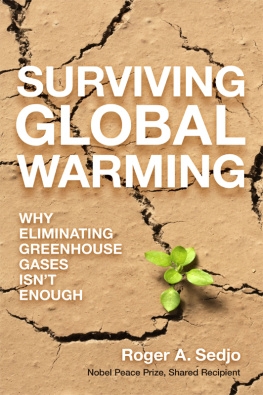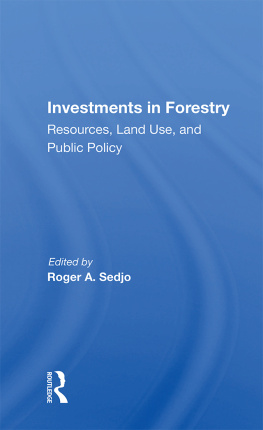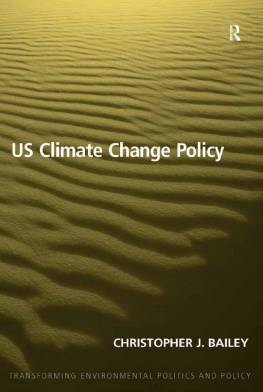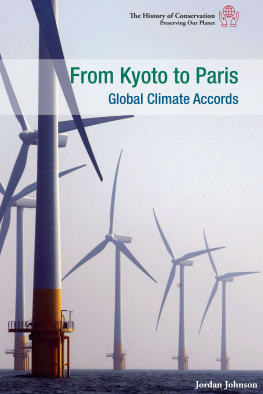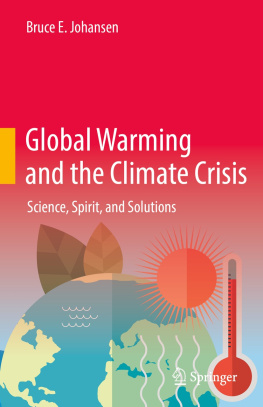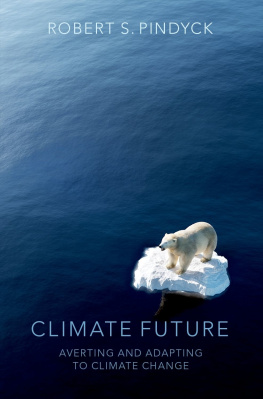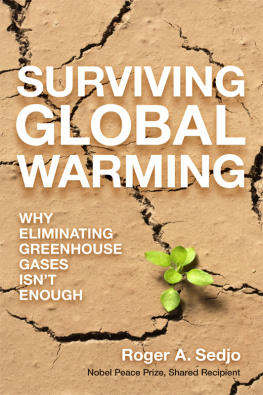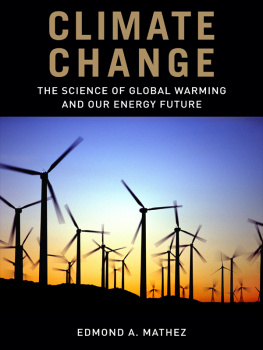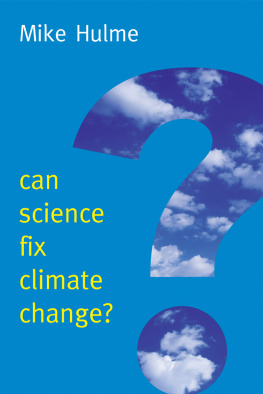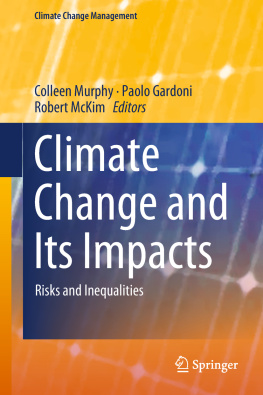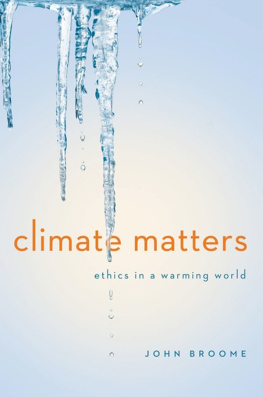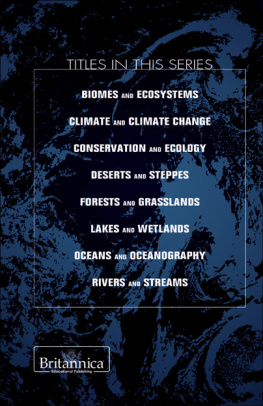
There are many people who are responsible for this book. Included are those at Resources for the Future (RFF), various US government agencies, and international groups, including especially my colleagues at the UN Intergovernmental Panel on Climate Change who worked with me on the various Assessments. As I have been working on this book directly, my wife, Ruthy, provided assistance and tolerated the various difficulties and stresses associated with this effort.
Upon my retirement from RFF, I had little initial interest in taking on another book. However, in retrospect such an endeavor was not unlikely as the climate issue continued to fester and grow as a social issue and I did have both a long history in the topic and a number of unresolved related questions in my own mind. Friends and acquaintances continued to raise the issue. Professor Dean Lueck, now at the University of Indiana but formerly at the University of Arizona, continued to raise technical questions and invited me to give presentations, including a number at his Natural Resources classes.
Other individuals I wish to thank include Franz Fauley and Peter Rodman, both recent friends, who stimulated my renewed interest with their questions as interested lay persons. My former colleague A. Clark Wiseman was most helpful, both with focused questions and with assistance in articulating more precisely some of the climate warming issues. Also, I thank my agent, Claire Gerus, who successfully operated through the process of finding the right publisher, and then pushed me into new climate territories as I moved through the completion of my writings. Finally, I wish to thank Prometheus Books and their staff and especially Steven L. Mitchell, editor, who provided guidance and editorial oversight throughout the process. Nevertheless, any errors that remain are solely those of the author. The book was not sponsored by RFF, and I am wholly responsible for its substance.

Late in the 1980s, both the US government and the research community began to pay more serious attention to issues related to climate change, and particularly global warming. It was well-known that the earth's atmosphere included a number of so-called greenhouse gases (GHGs). They are the gases in the atmosphere that absorb and reflect radiation, trapping the sun's energy as heat and thereby maintaining the warmth of the earth. The concept that changes in the composition of the atmosphere could change climate go back at least as far as Tyndall in the 1860s, and Arrhenius's seminal paper in 1896. In addition to water vapor, the gases included carbon dioxide, methane, and nitrous oxide, as well as some other gases less important for heat-absorbing purposes.
In 1989, the US Department of Agriculture held a meeting featuring a number of invited papers on the anticipated impact of climate change on agriculture. Presiding over this meeting was the late Dr. Bruce Gardner, a senior Department of Agriculture official, who informed us researchers that the coming years would see us deeply immersed in climate research. If climate change was not real, he noted, it would probably take many years to confirm its absence. If it were real, climate research would definitely gear up for many decades ahead.
Gardner was right, and since warming appears to be continuing and doubts of its authenticity diminish, research into the nature of this phenomenon and its implications has greatly accelerated. The objective: to better understand what drives global change as well as what the implications of climate change are likely to be for the future of Earth's inhabitants. Once understood, the next step is to identify actions and policies that can prevent warming and the damage associated with climate changeno small task, indeed!
To date, one view and one approach has gained prominenceand to a great extent, this is due to its most prominent supporter, former Vice President Al Gore, who has worked tirelessly to advocate and convince those in power, as well as ordinary citizens, to abandon fossil fuels in favor of alternate energies (e.g., wind, solar, etc.).
GORE'S VIEW
The bare bones of today's primary climate change view are described in Gore's bestseller, An Inconvenient Truth. As described in both the book and later the film, Earth's temperature is rising, due mostly to carbon dioxide and other greenhouse gas emissions released through the burning of fossil fuels, as well as deforestation for urban development, which releases certain GHGs from trees and soils. The implication is that we humans can save ourselves, and our planet, by being less greedy in our use of energy and, with the judicious use of technology to reduce energy use and to find alternatives to fossil fuels, in the form of renewable energy.
Gore attributed much of his interest in climate change to his Harvard teacher Roger Revelle, who, back in the 1950s, had been an early researcher of the link between carbon dioxide and global warming. However, Revelle became more skeptical of the power of this relationship as he grew older. In a conversation I had with Revelle in the late 1980s at Resources for the Future (where he was visiting for a meeting of RFF's Climate Resources Program Advisory Committee), he confided that he was concerned that Al Gore was
While Revelle's concerns launched similar criticisms from other scientists, the public continued to support Gore's view. Subsequently, rivals of the GHG embracers were tagged with the term deniers and cast as laggards amid the growing urgency for the world to do something! to save our planet.
Coming out of such debates, theories began to arise regarding the underlying causes of not only warming, but also of the growing environmental movement. Robert Nelson of the University of Maryland, for example, argues that environmentalism has a strong religious flavor. As the pressures of life cause us to feel under siege, he contends that we view ourselves in need of secular redemption.
Who or what will save us? Many believe we should cast off destructive environmental activities, including the use of fossil fuels, and look to technology or a simpler life for salvation. This would, of course, be a massive undertaking, given that the causes of warming are still under investigation and eliminating fossil fuels would doubtless generate substantial lifestyle changes. Nevertheless, environmentalism has an increasingly powerful influence on many of us, and climate change simply adds to the list of our concerns.
Despite these criticisms and others, An Inconvenient Truth clearly describes the GHG warming hypothesis, and has achieved almost universal acceptance worldwide, particularly among the leaders of major nations. The almost consensus acceptance of the Paris Climate Agreement attests to the widespread acceptance of the GHG view of climate change. In addition, some members of the American scientific community are skeptical of this view and have pushed back, regarding this view as overly simplistic and as ignoring a number of relevant facts.
A theory of climate change must, some believe, provide an understanding not only of humankind's impact on climate, but that of natural events, such as historical climate change and the global climate cycle driven by nonhuman forces. Most contemporary research, they note, has focused on human-generated agents, ignoring much of the earlier climate change prior to the advent of significant human activity.
Let me be clear: Gore's view that GHGs have caused warming certainly has merit. It follows quite closely the contemporary observed climate behavior. Scientists have known since at least the early part of the twentieth century that the gaseous composition of the earth's atmosphere can affect the amount of heat from the sun's solar rays captured on the earth. If there is a significant increase in the fraction of the earth's atmosphere consisting of carbon dioxide, methane, and other heat-capturing greenhouse gases, the solar energy captured should definitely increase the earth's temperature.
Next page
